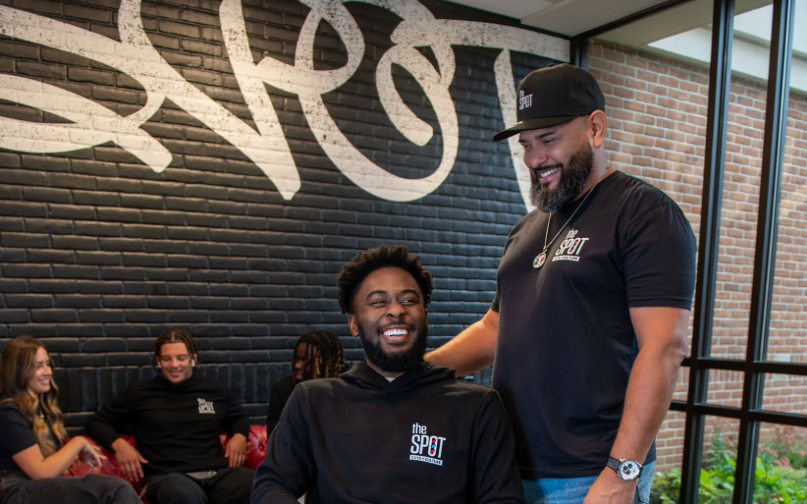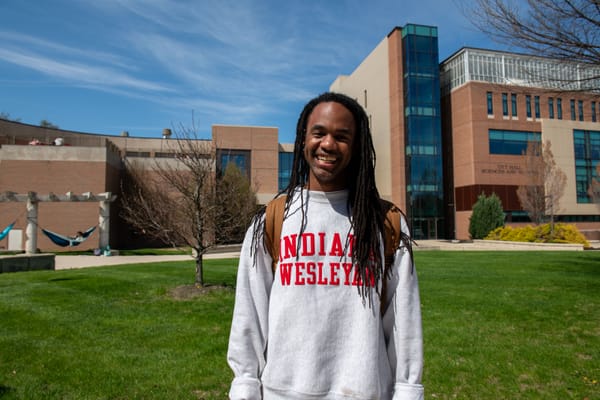The SPOT: A Place to Belong

Mario Rangel has been giving haircuts for over fifteen years. At one point in time while running his business Tiger Martial Arts Fitness Academy, Rangel even had a barber chair set up there where he would cut hair a few times a week. Men would come in not just for a haircut, but to hang out, talk about their passions, and connect on a deep personal and spiritual level. Every cut was a chance to connect with the person in the chair, speak into their life, and provide a sense of belonging. “In urban culture, haircuts are more than just maintenance,” Rangel said. “They’re an experience.”
Three years ago, Rangel had the idea to move this passion from a small part of his business to a full barbershop where young people could get culturally meaningful haircuts with a focus on Christian mentorship. While this idea was taking form, he didn’t have a clear way to actually make it a reality until a year-and-a-half ago when he became executive director for IWU’s Intercultural and Global Office (IGO). He started sketching out his dream of a barbershop, but he also knew that if he was going to seriously attempt to make it a reality finding the right barber was crucial. He didn’t just need someone who was a skilled barber, he needed someone who felt the heart of this mentorship mission and was on-fire about its intended impact as he was.
Rangel had heard that Kalib Kemper was a great barber from people who knew him, so one day he stopped by his shop, Fresh Kutz, to talk with Kemper about the idea. Although they didn’t know each other, Rangel told him that he believed God wanted IWU to have a barbershop on campus, and that he felt like Kemper was supposed to be the barber. Unbeknownst to Rangel at the time, Kemper had been trying to find a way to reach IWU’s multicultural students for years and had not found a successful avenue to do so.
Rangel invited Kemper and his wife to visit campus with him and discuss things further, and during that visit it didn’t take him long to realize God had led him to the right person. As they got to know each other and discuss their increasingly aligned vision for the barbershop, it became clear to Rangel that Kemper was a man who loved God and his family dearly, and whose testimony brought both empathy and strength to everyone he meets.
Although Rangel had found the perfect partner for turning the idea into a reality, there was still a lot of work that needed to be done. Over the next several months, Rangel worked with Kemper’s help to secure the needed approvals for the barbershop, find the perfect location, transform the location into a space that would be welcoming and appealing to students, and share the vision with others who could help support it. “We faced the usual business hurdles, but the support was incredible,” Rangel remembers. “No negativity—only people asking how they could pitch in.”
IGO Assistant Director Jonathan Mpanzu and IGO Interim Assistant Director Camryn Bobiak soon joined Rangel in creating the barbershop, along with a variety of IGO student workers and intercultural ambassadors, providing help with everything from price charts to the grand opening. Marketing, facilities, IT, Executive Vice President Dr. Karen Dowling, and President Dr. Jon Kulaga also all played integral roles in coming alongside Rangel and Kemper to make the SPOT a reality.
Years of dreaming and over a year’s worth of effort came to a culmination on October 16, when the community gathered for the grand opening of the SPOT (Special Place of Transformation). “I’m not usually one to tear up, but I truly felt the Holy Spirit in that little shop when Sheriff Garcia shared his testimony. Having him—the first Latino sheriff [of Grant County]—alongside our first African American mayor and our very own Dr. Kulaga in the same room was powerful.” That afternoon, the Marion and IWU community came together to celebrate God, Kingdom diversity, and the importance of connection.
Since its opening, student support for the SPOT has already been immense, with it quickly transforming into the go-to place for fresh cuts among students. While the SPOT is only open at certain times, so that Kemper can continue to maintain Fresh Kutz as well, the seats are constantly full when open. Through the recommendation of Jonathan Mpanzu, the athletic teams quickly discovered the SPOT and have already gotten involved. Recently, the basketball team came by for cuts, devotion, and what Rangel likes to call “a bit of iron-sharpening-iron.” Jonathan and Kemper provided the cuts while Rangel led a devotional.
At its core, the SPOT is about more than just haircuts—it’s a place for students to gather for devotionals, workshops, and community fellowship. “It’s our way of celebrating differences, Kingdom diversity, and creating a true sense of belonging,” Rangel explains. “We have a wonderful opportunity here to serve our students, offering not only fresh cuts but also cultural connection and Christ-centered support.”
Rangel understands that not everyone will see the need for the SPOT and some might be confused by why it’s necessary. He invites anyone curious or confused to come by and have a conversation with Kemper or himself to get a better understanding of it. “When we visit places like Mexico, we respect and even embrace the cultural differences we encounter. But doing the same in our own backyard can be a bit harder,” Rangel notes. “Everyone views life from the culture, background, and experiences they’ve encountered and been immersed in, but when you connect with someone different from yourself, your experiences shift and begin to blend. It can be messy, unfamiliar, and take effort sometimes, but the result is often a richer, fuller perspective to life. That’s what Kingdom diversity looks like, and that’s what the SPOT exists to cultivate.”




